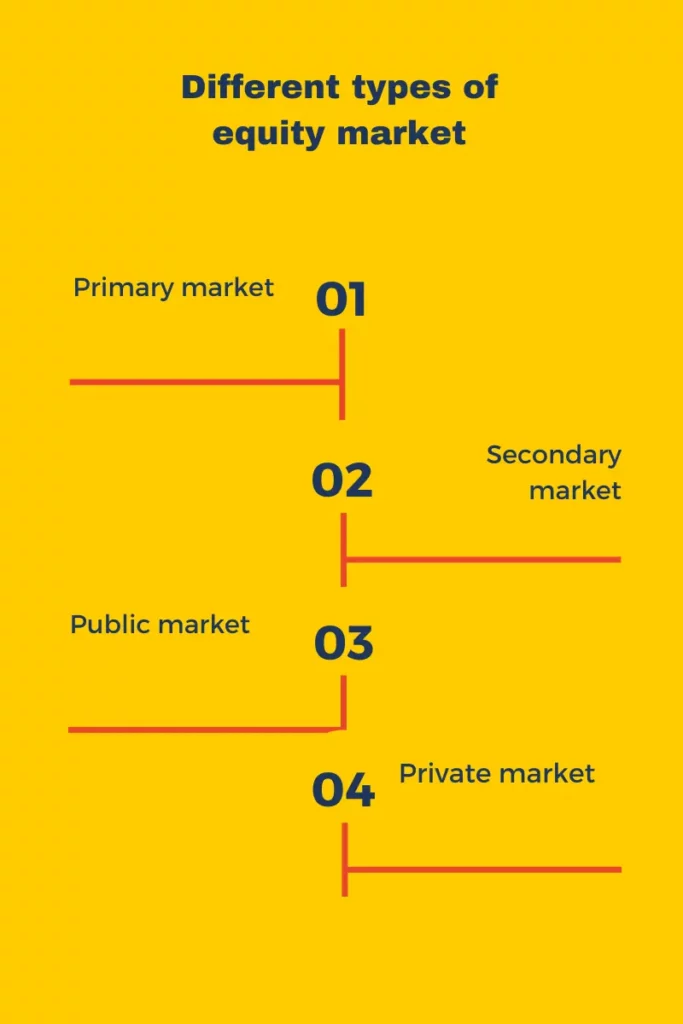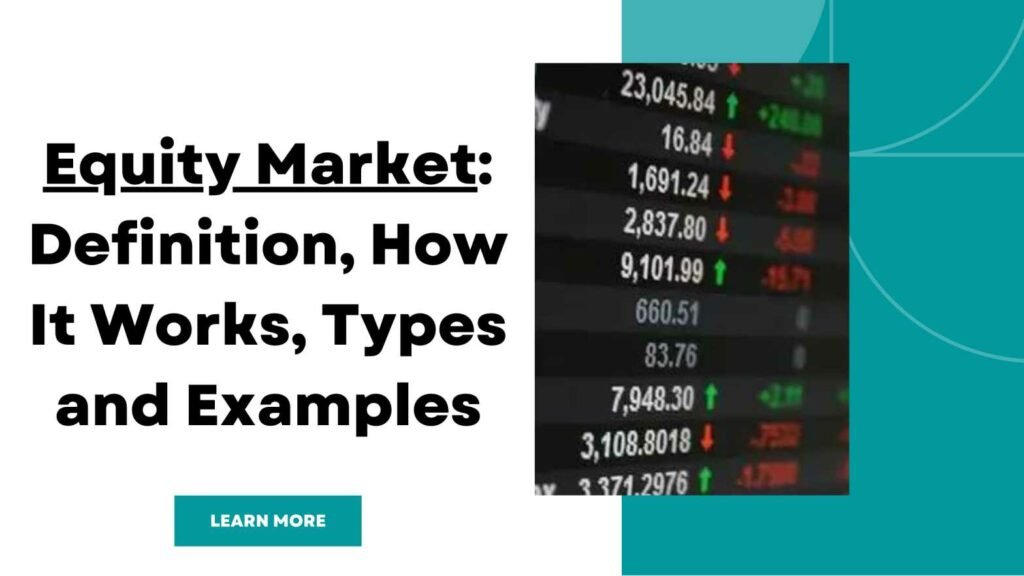Last updated on September 1st, 2025 at 03:09 pm
An equity market offers investors quick access to stocks of publicly traded companies. It offers a convenient way for investors to increase their capital and generate more profits. A range of equity markets cater to diverse categories of investors and companies.
So, understanding the intricacies of the equity market is important for every investor. Navigating its market needs extensive knowledge, analysis, and intuition. In this guide, we will discuss what is equity market, how it works, its types, and examples.
What is the equity market?
Before trading, it is important to know the equity market meaning. Well, the equity market is the meeting point of the sellers and buyers of stocks. Within the equity market, investors trade securities into two main categories: privately traded stocks and public stocks.
Investors exchange private stocks through intermediaries. It mainly represents the ownership interests in companies. This allows investors to participate in the success and growth of the business. The equity stock market offers a platform for all investors to grow their capital.
With it, the investors purchase and sell the shares based on profitability and future performance. So, it will be fair to say that equity can bring high returns to investors.
How does the equity market work?
Different mechanisms streamline the buying and selling of shares. It influenced investor behavior and stock prices.
So, after knowing what is equity in share market, understanding how it works is important. At the core, the equity market operates via several channels:
- IPO or initial public offering
Private companies conduct an IPO when they first decide to go public and offer their shares. This process helps the companies to raise capital by selling shares to investors. When they complete the IPO, their shares get on the stock exchange list.
- Secondary market
Once the IPO issues the equity shares, they enter the secondary market. This is where the investors buy and sell assets. The prices of the secondary equity stock market vary on the supply and demand dynamics.
- Stock exchanges
The equity in the share market occurs on stock exchanges. These exchanges offer regulations and infrastructure important for orderly trading.
- Market participants
After knowing what is equity trading, it is important to know the market participants. The participants are institutional investors, individual investors, brokers, traders, and market makers. Every participant plays a crucial role in shaping the market liquidity and dynamics.
- Price discovery
An important thing in the equity market is the price discovery. Here, the interaction of the sellers and buyers determines the stock’s fair market value. For instance, when the demand for a stock increases, the price of it will rise automatically.
- Regulation
Any investor will never know the whole equity market meaning without understanding its regulations. Different regulatory bodies strictly regulate the equity market to maintain transparency and fairness. It protects investors and prevents market manipulation.
Investors wanting to learn about the equity trade life cycle can opt for Investment Banking course.
Different types of equity market
Many novice investors ask, what is equity market? What are the types? There are four types of equity markets. The types depend on many factors, like company size, geography, and trading methods.
- Primary market
It is one of the types of equity market that investors use to issue new shares via IPO. This type helps investors raise their capital by selling ownership stakes for the first time.
- Secondary market
The secondary market is mainly the stock market. Here, the investors buy and sell the issued shares.
- Public market
One of the most important types of equity market is the public market. It is for the general public. So, anyone can purchase and sell shares on stock exchanges.
- Private market
When investors are involved in the trading of shares in private companies, it refers to the private market.
So, these are the types of equity market. Every market comes with its own characteristics and investment opportunities. Anyone looking to expand their knowledge in the equity market can enroll in the Investment Banking course. Through this extensive program, one could become an equity expert.

Trading in the equity market
After understanding the concept of what is equity in share market, learning how to trade is important. In the stock market, investors make offers to buy stocks at a specific price. But, the sellers ask for a certain price. After a proper negotiation, a sale happens.
- Often, several investors want the same stocks. In that case, the first bidder always gets the stock. When a buyer wants to pay any price to buy the stock, they purchase it at market value. Likewise, whenever a seller accepts any stock price, they sell at the market value.
- When companies sell their stocks on the market, they become publicly traded. Here, every stock represents ownership, and it attracts investors. So, when the companies perform well, the stock value increases, and investors get rewards.
- To get a clear understanding of what is equity trading, investors must know the potential risks. Whenever the companies struggle, the stock price value always drops. But, investors can buy and sell stocks quickly.
Examples of equity market
It is important to know the examples of the equity market to understand the equity market meaning properly. So some examples are:
- National stock exchange (NSE) and Bombay stock exchange (BSE)
These two stock exchanges are the most popular and largest stock exchanges. It lists a wide range of companies in India.
- New York stock exchange (NYSE)
Another significant stock exchange is the New York Stock Exchange or NYSE. It features companies from the US and other International companies.
- NASDAQ
This equity stock market exchange is famous for its growth and technology-oriented companies. It is a leading stock exchange that streamlines the trading of shares for several innovative companies.
- London stock exchange
It is one of the most established and oldest stock exchanges. This stock exchange features companies from different sectors.
In conclusion
The equity market has become a significant platform of the global economic system. It allows investors to improve their growth potential. But, anyone who wants to trade in the equity market must have an understanding of what is equity market.
With the basic idea, they can target specific stocks and invest in the most suitable stocks. To learn the fundamentals of the financial market and equity in-depth, enroll in the Certified Investment Banking Operations Professional course.
This Imarticus program is suitable for every type of learner. Through this, learning crucial skills is possible. Investors can also get a clear view of what is equity in share market, which helps in future trading.
FAQ’s
Yes, the stock represents the ownership equity in a company. It entitles the shareholders to a proportional share of the earnings and assets.
To know the equity market meaning, it is important to understand the difference between shares and equity. Shares refer to the individual units of ownership in a company. However, equity is the total ownership interest of the shareholder.
Investors can calculate the equity based on the difference between liabilities and a company’s assets. It means the formula is: Equity= Assets – Liabilities.
Yes, investors can do online equity trading using online broker platforms. For that, they have to open a trading account to invest in the live equity market.

